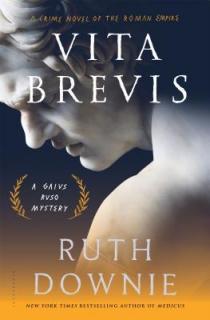The further adventures of Ruso, medical officer late of the 20th Legion, and his British wife Tilla, and their adopted daughter Mara.

A turn of fortune brought them to the capital of the world, Rome. Tilla resisted leaving Britannia, but needs must and off they went.
She found Rome even more awful than she expected and her expectations were very bad. For his part, once there, Ruso cannot quite remember why it seemed a good idea to go to Rome. Tilla heroically resists saying ‘I told you so’ for as long as she can. Not long that.

The disorder, noise, smells, expense, rudeness, violence, are just some of the vita Romana. Little has changed since then, to be sure.
The patron who sponsored their migration, luring Ruso away from his army sinecure, where he had long since worn out his welcome, is likewise not sure now that it was a good idea. There seems to be nothing for Ruso to do, and Rome is full of doctors, snake-oil salesmen and, for that matter, saleswomen, faith healers.
However when Doctor Kleitos is called away to the country, Ruso is nominated by his patron as the locum. Excellent, thinks Ruso, because the quarters will get them out of the overpriced hovel they are renting and the surgery will generate some sesterices.
Odd though that Kleitos seems to have taken everything not bolted down, tables, chairs, crockery, and all his medical records for a temporary leave. Even odder that a dead body is delivered to the front door in barrel.
Thus does the plot thicken.
Ruso is so wonderfully vague and easily distracted, so painfully well meaning and imperceptive, technically adept at medicine and foolishly brave that he charms the reader. TIlla is so determined, impetuous, and resourceful it makes the reader wonder how the Romans ever conquered her tribe.
She sings Mara to sleep with British songs of triumph, while Ruso worries about the dosh he does not have, and puzzles over the fool’s errands his patron dishes up. What is going on? Then there is that dead body….. It has nothing to do with them but it has put a curse on the medical practice, compromised the patron, and generally gummed up the works. Like it or not, they are going to have to figure it out.
Apart from the historical setting the most amusing elements in these novels is the by-play between Ruso and Tilla, man and wife. At one point, amid the confusion, she agrees with him, calls him wise, and meekly defers to him on some point. He puffs up and as he leaves, he starts wondering if she is ill. What else could explain this submission.
Ruso has his own moments. When an accident causes injuries on a building site there is the competent legion doctor performing triage, applying tourniquets, snapping dislocated bones back into place while the dust is still flying. When quiet returns so does the self-doubt, regret, and weakness that dog his steps.
Tilla may be small and foreign, but she has learned to survive, as some heavies come to extort money discover to their regret. As she seems to drop to her knees to beg mercy, she is achieves the angle of attack!
 Ruth Downie
Ruth Downie
This is the latest in a long running series. The learning is worn lightly but there is a mountain of historical research in each book that is made intelligible to the reader. It must difficult to maintain the momentum and to reiterate the freshness and vitality of the two principals each time, but so far, so excellent.
The author starts with a blank screen and the silent expectations of readers. The days and months pass and finally there is a plot, a story, and a manuscript. Then the real work begins of whacking it into a novel.
After all that work, one reviewer on Good Reads has this to say:
‘A non-offensive and not super engaging story about the Medicus and his family in Rome. It was a fine time passing book, but not one I would recommend.’
I would give that remark one star (*) and say it is lazy, inept, and self-indulgent. To sum it up in English: ‘An inoffensive story that did not engage my attention but I did read it.’ This reader’s recommendation is something I can live without.
Skip to content
